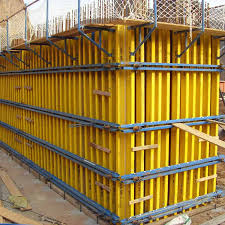జూలై . 27, 2024 22:01 Back to list
Leading Manufacturer of Traditional Formwork Solutions for Construction Industry Needs and Innovations
The Role of Conventional Formwork Manufacturers in Modern Construction
In the fast-evolving world of construction, where timelines are tight and quality demands are high, the importance of effective formwork cannot be overstated. One of the key players in ensuring the structural integrity and efficiency of construction projects is the conventional formwork manufacturer. These manufacturers provide essential systems that enable builders to form concrete structures, from simple walls to complex high-rise buildings. This article explores the significance of conventional formwork manufacturers in modern construction.
Understanding Conventional Formwork
Conventional formwork refers to the temporary structures used to support freshly poured concrete until it can bear its own weight. Traditionally, these systems have been made from wood, metal, or a combination of both, tailored to meet specific project requirements. Conventional formwork differs from modern systems such as plastic or reusable formwork, but it remains a cornerstone of the construction process, especially for projects that require bespoke solutions.
The primary components of conventional formwork include panels, props, and braces. Panels are flat surfaces that create the mold for concrete, while props support horizontal elements, and braces ensure stability. Each element must be engineered to withstand the weight of wet concrete and any additional loads during curing.
The Importance of Quality and Safety
One of the critical reasons to rely on reputable conventional formwork manufacturers is the quality and safety of their products. Construction safety is paramount, and the failure of a formwork system can lead to catastrophic results, including accidents and project delays. High-quality formwork minimizes these risks by ensuring structural soundness. Manufacturers invest in rigorous testing and quality control processes to meet the stringent safety standards set by regulatory bodies.
Moreover, innovation in materials and design has led to improved durability and ease of use. For instance, manufacturers are increasingly utilizing advanced materials that resist water damage and warping, thereby enhancing the life expectancy of their products. This attention to quality results in more reliable formwork solutions, ultimately contributing to the overall efficiency and safety of construction operations.
conventional formwork manufacturer

Customization and Flexibility
One of the hallmarks of conventional formwork manufacturers is their ability to provide customized solutions to meet the specific needs of varied projects. No two construction sites are identical, and conventional formwork can be adapted to fit unique architectural designs and site conditions. This level of customization is particularly beneficial for contractors who need to achieve specific aesthetic outcomes or who are working in challenging terrains.
Manufacturers often work closely with engineers and architects to develop tailored formwork systems that accommodate specific design intricacies. This partnership ensures that the formwork is not only functional but also aligns with the overall vision for the project.
Cost-Effectiveness and Sustainability
While the initial costs associated with purchasing or renting conventional formwork may seem high, the long-term benefits often outweigh these expenses. High-quality, durable formwork can be reused across multiple projects, significantly reducing costs over time. Additionally, many manufacturers are adopting sustainable practices by using eco-friendly materials and practices, which help minimize the environmental impact of construction activities.
Moreover, using conventional formwork can improve project timelines, as streamlined setup and dismantling processes contribute to faster project completion. This efficiency can lead to substantial savings and increased profitability for contractors.
Conclusion
Conventional formwork manufacturers play a vital role in the construction industry, providing essential products that ensure structural integrity, safety, and efficiency. Their commitment to quality, customization, and sustainability positions them as invaluable partners in the construction process. As the industry continues to evolve, the innovations and improvements made by conventional formwork manufacturers will remain integral to meeting the challenges of modern construction, paving the way for safer and more efficient building practices across the globe.
-
Expert Ringlock Scaffolding: Durable, Safe, Efficient Solutions
NewsAug.28,2025
-
Ringlock Scaffolding: Strong, Safe & Efficient Solutions
NewsAug.27,2025
-
OEM Column Formwork: Circular, Curved & Inclined Solutions
NewsAug.26,2025
-
Premium Scaffolding Jacks: Stable, Adjustable & Durable
NewsAug.25,2025
-
OEM Wall Formwork & Shuttering: Flexible & Curved Solutions
NewsAug.24,2025
-
Adjustable Heavy Duty Props for Slab Formwork | Strong & Reliable Support
NewsAug.23,2025